Tips for a More Eco-Friendly Life in Switzerland
Living an eco-friendly life is not a straightforward proposition. Like many parents, I care about the environment and I don’t want my family unnecessarily exposed to toxic chemicals. But it’s not always clear what to do about it, particularly in a foreign country where many of the products and brands are unfamiliar.
About a year ago, I decided to try replacing all my household products with eco-friendly versions. First, I had to do some research, and wow – it was overwhelming. I thought I could just print a list of bad chemicals, look at the ingredient list on each product and make a decision. It’s not so simple.
First, there are dozens of websites with long lists of chemicals that “may give you cancer” or are “suspected endocrine disrupters” or other horrible things. However, other sites said that while high exposure to certain household chemicals in a lab setting does cause cancer and other medical problems, in regular household use, the exposure is typically small and causality not as clear. Should I avoid everything on every list with a “better safe than sorry” approach or just the really bad stuff that has lots of research behind it?
Second, many brands available in Switzerland aren’t reviewed by environmental watchdog groups, so we must do our own leg work. This is difficult, because many brands are misleading in their marketing. Just because something is labeled Eco-Friendly or Organic doesn’t necessarily mean it’s better for you or the environment, and many still contain some of the “bad” chemicals. The ingredients lists are tiny and hard to read; I resorted to taking a picture of each ingredients list and zooming in to read it. Others use alternative names for the chemicals, so they aren’t immediately recognized as “bad.” Even worse, some products don’t list all their ingredients. (Links for more information on “bad” chemiclas at the end of this article.)
This was harder than I had anticipated. What to do? These things were clear:
- I’m not a scientist. I don’t have the time or expertise to evaluate all the scientific studies on various chemicals.
- I’m not an exposé journalist. I don’t have the time or resources to research the business practices of each company to determine if their eco-friendly claims are valid.
- I’m not a homesteader. I’m too busy and/or lazy to make “natural” versions of all my household products.
- I’m not an extremist. I’m simply not interested in living a Zero Waste lifestyle and living without toilet paper.
Who am I? I’m a busy mom with limited time and money who wants to make a few changes. So I accepted a few compromises. My general attitude is “a few imperfect changes are better than none.”
With that in mind, here are a few easy, practical changes I made over the past year to improve the eco-friendliness of my household. I did each of these over the course of a few months and it wasn’t too painful. Don’t get overwhelmed thinking you have to overhaul your life. Just pick one thing on the list, find a good solution for your values and lifestyle, then move to another thing on the list.
Household cleaning
This one was easy and a good place to start. For new purchases, I bought only eco-friendly brands, like the Migros or Coop house brands. I chose to simply trust their claims and hope these are slightly better than regular brands. They are more expensive than other brands but they last so long that it only ends up being a few francs difference over the year. Coop also sells the slightly sexier Method products. In Germany, the Frosh brand is widely available and inexpensive.
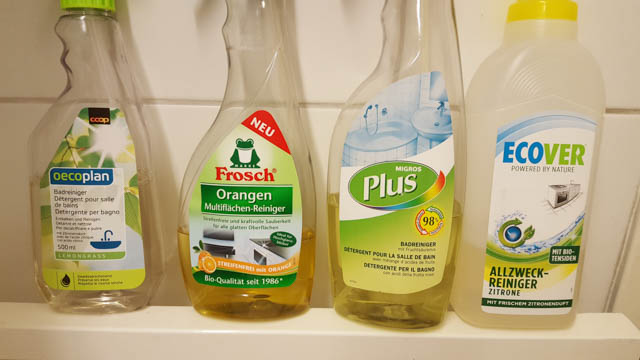
However, cleaning products are not required to list all their ingredients. So the listed ingredients often represent only a small percentage of the actual ingredients. Just as a sample, the photo below shows the ingredient list for Ecover Allzweck Reininger, Migros Plus Badreiniger, and Frosch Multiflächen Reiniger where the listed ingredients represent only <5% of the total.
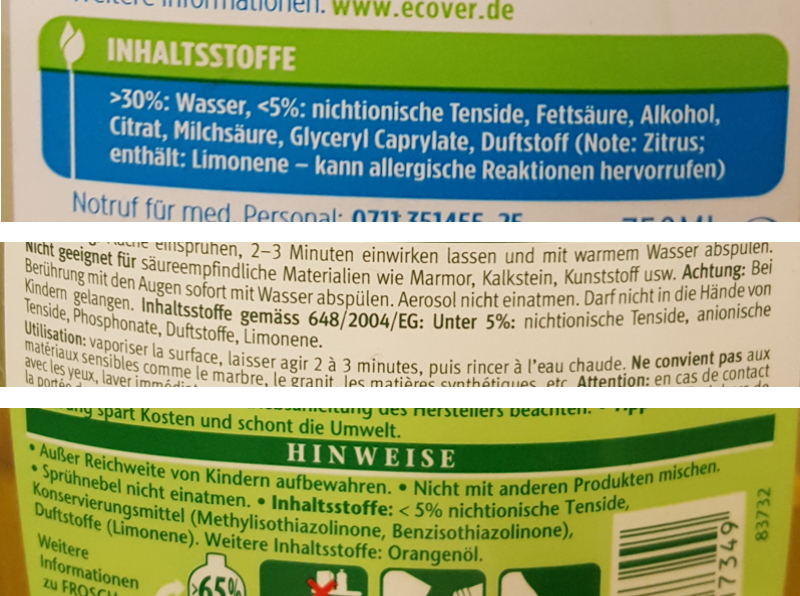
I tend to use vinegar for most general cleaning, but it doesn’t work for everything. So here are some links for more DIY natural cleaning products for specific cleaning problems:
Many DIY cleaning solutions ask for the following ingredients, which can be hard to locate in Switzerland:
- Baking soda, a.k.a. Natron, is available at every grocery store in individual packets. However, many ethnic markets sell larger jars or packets inexpensively. The Barkat market in the Zurich area sells a jar for 1 franc.
- Borax, also know as sodium borate, is a naturally occurring mineral commonly mined from dried salt lakes. It can be purchased at pharmacies.
- Some call for Castile soap, which is olive oil-based. The Dr. Bronner’s brand is available online at www.dhania.ch. It is a bit difficult to find in Switzerland but the English Forum has some suggestions.
- Hydrogen peroxide, or Wasserstoffperoxid, is available at pharmacies, in different concentrations. Check this thread at English Forum for more info.
Note: Remember to dispose of chemical-laden cleaners as “Sonderabfall,” or hazardous waste, at waste management centers.
Dishwasher tabs
I had been using eco-friendly hand washing soap for years. But the dishwasher tabs seemed too expensive until I actually did the price comparison. Surprisingly, the price difference is minimal between the regular and eco-friendly brands. Both the Migros Oeco Power brand, which I prefer, and the Coop Oecoplan brand cost about Fr. 0.20/piece, about the same as the budget Handy brand and much less than the premium Finish brand. I’ve also tried the Held Ecover brand, but it is more expensive (about Fr. 0.46/piece at Migros, cheaper in Germany) and didn’t work as well for me.
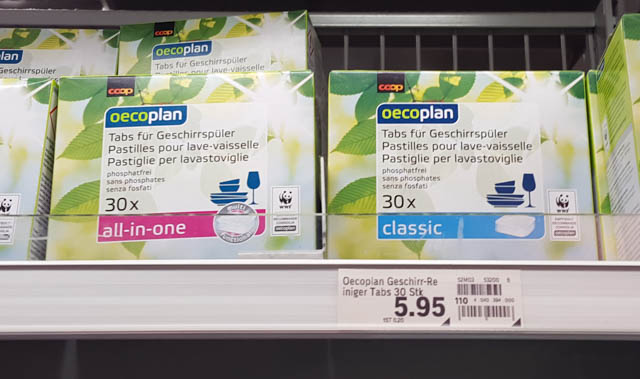
Personal care
This was a difficult category for me. For shampoo, conditioner, and body soap, the main ingredient to avoid here is sodium laureth sulfate, which allows soapy suds to form, and is a typical ingredient in shampoo, soaps, toothpaste, etc. It also may cause cancer and other medical problems. You can read more about SLS research (which is minimal) on www.slsfree.net, to decide if you want to avoid this or not.
I tried a lot of different SLS-free brands and I found most unpleasant to use. The shampoos are typically light and hard to spread around on my hair. The hair conditioners were waxy, heavy and hard to wash out.
The only brand I liked was Speik, which I bought at Müller in Germany. I like their shampoo, conditioner and especially their bar soap. Weleda brand was good as well, but very expensive, even in Germany.
The most unpleasant products were the perfume-free ones, particularly the face lotions; avoiding perfume is mostly important for those with allergies or sensitive skin. All the non-perfumed ones I tried smelled quite bad because the perfume covers up the nastiness of the other ingredients. Since my family doesn’t have allergies, I decided that I prefer products with perfume.
Here is the shampoo ingredient list comparison of Speik on the left and Garnier on the right.
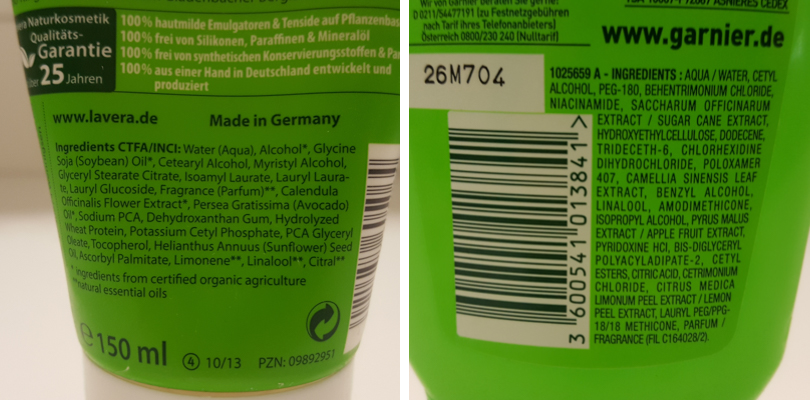
Here is the “natural” strategy from Kniepp and the ingredient list for their “Gute Laune” liquid bath soap.
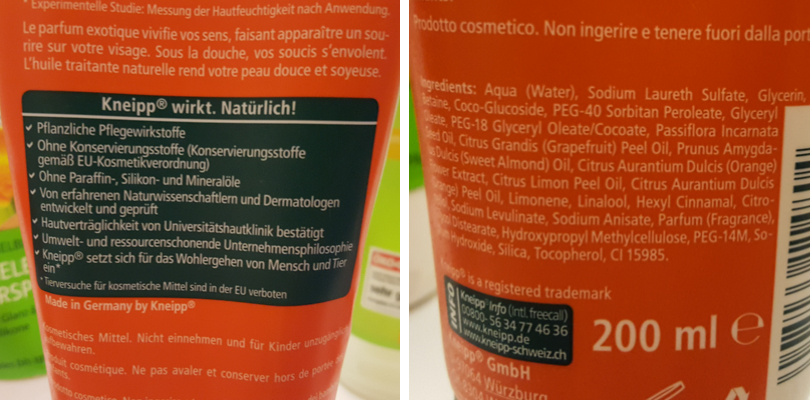
Toothpaste
This is a hard one. Some claim that the chemicals in toothpaste are poisonous and unnecessary (www.mercola.com). Toothpaste companies say these chemicals and additives, like fluoride, are vital to dental hygiene (www.colgate.com). I’m not sure who to believe, but I tend to agree with Dental Buzz that toothpaste is primarily a cosmetic; we use toothpaste because it tastes good, not because it protects our teeth.
So as an experiment, I looked for toothpastes without SLS, fluoride or artificial sweeteners.
The bad news is that they are all pretty horrible. Without artificial sweeteners, they simply don’t taste good and my mouth never had that fresh feeling. Without SLS they don’t foam, so the mouthfeel is not great. Many “natural” brands still include SLS, so probably not worth the price or unpleasant flavor.
There were only three brands I didn’t hate. Elmex, available at Migros, has a version without fluoride or SLS, but it still has artificial sweeteners. The Alnatura Mint toothpaste tastes pretty good and doesn’t have SLS, but it does have fluoride. Weleda was the most “pure” version, without SLS or fluoride or sweeteners, but also the most expensive.
I use these occasionally when I feel my conscience weighing on me. But to be honest, I still prefer the yummy Colgate MaxFresh, even though it might be killing me.
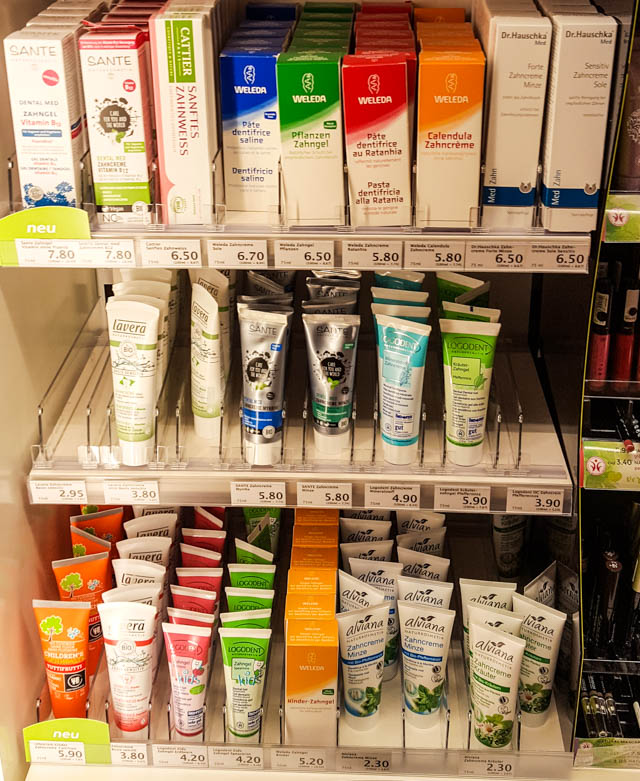 Reusable produce bags
Reusable produce bags
Reducing waste, particularly unnecessary plastic was part of my eco-friendly plan. I was already using reusable shopping bags. But I was still bagging my produce in the small, free plastic bags. In a burst of creative energy, I made my own mesh produce bags. But happily, Migros recently starting selling reusable mesh produce bags in the produce section, as shown in the below photo. It’s about SFr.10 for four bags, a reasonable price compared to online options.
One tip: After weighing the produce, the sticker with the price may not adhere to mesh bag. I just stick the sticker on other products I’m purchasing at the same time.
Here are a few other options available on Amazon.de:
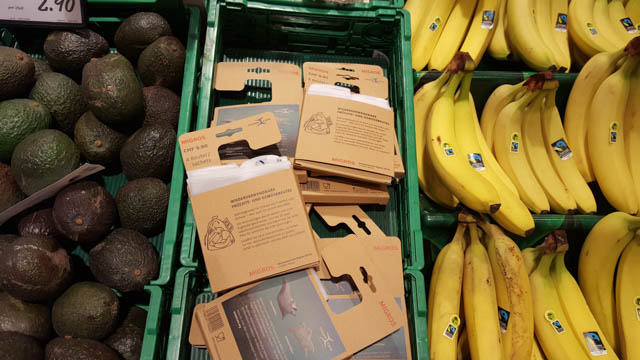
Shop at the farmers’ markets
There are a lot of good reasons to shop at the farmers’ market: supporting local farmers, fresher produce, access to special products, etc. But for this project, I realized that much of the produce at regular grocery stores is packaged in plastic or other wasteful packaging, even broccoli and lettuce.
At the farmers’ market, none of the produce is pre-packaged in plastic. And if you bring your own reusable produce bags, you can shop entirely plastic free.
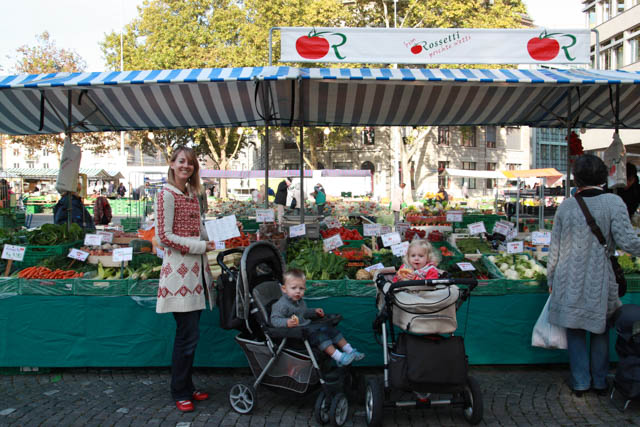
Cloth napkins
I’m not ready for a Zero Waste lifestyle, but one easy change was to switch from paper to cloth napkins. I already had a big stack of cloth napkins I had received for my wedding, but had been saving for a special occasion that never came. So I put them into regular rotation and I love it. It not only reduces waste but it also makes our table feel more personal and welcoming.
All the department stores carry cloth napkins, but I like the ones from Butler’s, which are colorful, patterned and affordable.
Here are a couple of websites about the Zero Waste lifestyle if you feel more motivated.
- Zero Waste Home – from Bea Johnson, the most famous icon of this movement
- Zero Waste Mommy – with tips on cloth napkins
- Zero Waste Switzerland – tip and tricks specific to Switzerland
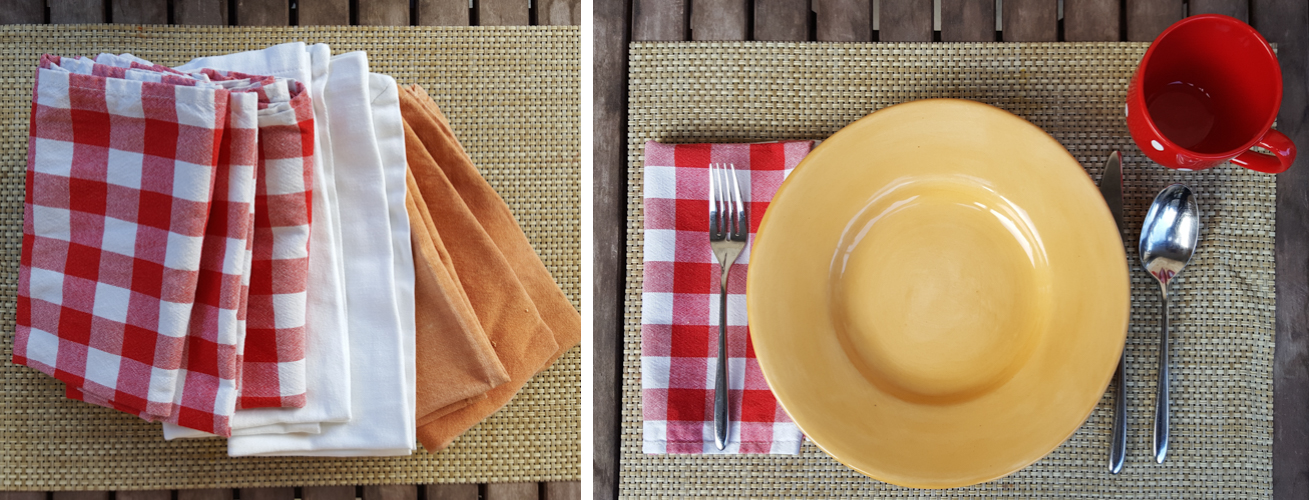
Biodegradable trash bags
In many Swiss communities, you are required to buy the official plastic trash bag for disposal. But I still use small plastic liners in the wastebaskets around my house, so I bought biodegradable/compostable bags for these liners. They are thin and are best for small, light use. It’s an expensive option at thrice the price of regular plastic liners (in Germany, slightly cheaper). So I don’t always buy them, and if the trash is mostly dry, I tend to dump out the trash instead of putting in new bag every week.
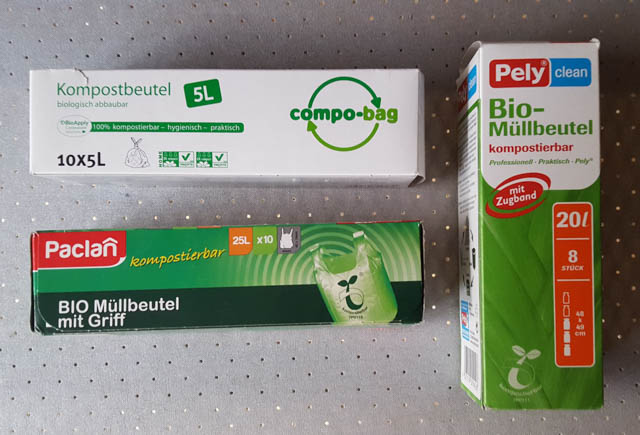
Feminine hygiene
During this project, I stumbled on organic tampons, which never occurred to me as needing to be organic. But of course, after reading the marketing material, I was persuaded. Alnatura stores carry the Natracare brand, which cost about twice as much as mainstream brands. According to their website:
Most brands of tampons are made from a mix of rayon and non-organic cotton, and are commonly chlorine-bleached. Some tampons may even be wrapped in a plastic outer, or be dyed a different colour. Rayon is a highly absorbent fibre which rapidly absorbs menstrual blood but at the same time can also dry out the natural protective mucous lining of the vagina. We believe that women should not be exposed to pesticide residues, phthalates, azo-dyes and dioxins, especially in such a sensitive and absorptive part of the body.
Something to consider, but I’m going to see if I can find them cheaper in Germany.
An increasingly popular alternative is menstrual cups, which are becoming more readily available in Switzerland. The Organicup brand is available from www.ecco-verde.ch.
Diapers
Sadly I’ve already thrown hundreds of diapers away. Sorry, Mother Earth!
There are a few organic diaper brands in Switzerland, which means the raw materials are partially from recycled materials and/or the production of those ingredients was done according to organic standards. I’ve used the Coop Organic brand with good results. They are similarly priced to other diaper brands.
If you are considering reusable cloth diapers, I found these websites that discuss cloth diaper services in Switzerland in detail:
- Lausanne Mom – Using Cloth Diapers in Switzerland
- Swiss Lark – Washing Cloth Diapers in Switzerland
- Jubliane.ch – online store offering various cloth diaper products
Laundry
This is the one area where I save big by shopping in Germany. At Müller or Kaufland, I stock up on the eco-friendly Frosch laundry soup and fabric softener, priced at less than half the cost of the same and similar products in Switzerland. I have also tried Migros Oeco Power laundry powder, which works just as well and is similarly priced to other laundry powders in Switzerland.
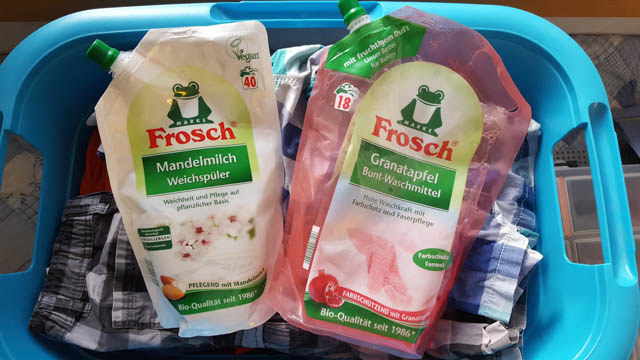
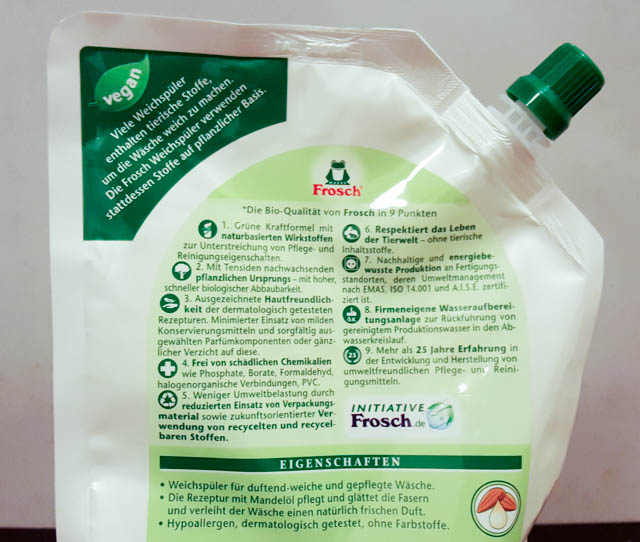

———————-
I hope you find a few ideas that work for your family. I’ll close with a few resources and tips to aid your shopping.
Chemicals to avoid
There are dozens of websites with lists of chemicals to avoid. I’m not going to provide a definitive list here, but I will refer you to the Environmental Working Group, a U.S. non-profit focused on environment and public health. Their website reviews thousands of consumer products in terms of safety and environmental impact, including cosmetics, personal care products, cleaning products, and food.
I also like GoodGuide, which helps you “find safe, healthy, green, and ethical product reviews based on scientific research.” However, many brands that appear on these sites are not available in Switzerland.
Brands available in Switzerland and Germany
Here are the eco-friendly brands for household products I found readily available in Switzerland. Unfortunately, many of these brands are not reviewed by watchdog groups.
Migros – Migros Plus Oeco Power (house brand), Milette Naturals, “I am” Natural, Kneipp, Hipp,
Alnatura – Alnatura (house brand), Weleda, Sante, Lavera, Farfalla, Logona, Sonett, Alviana, and several others.
Coop – Coop Oecoplan (house brand), Ecover, L’Arbre Vert, Method, Frosch, Sonett, and Held.
Müller and DM in Germany sell a wider variety of eco-friendly brands at much lower prices.
Natural/health stores, usually known by the name Reformhaus, in both Switzerland and Germany sell more boutique organic and eco-friendly brands.
The Ecolabel Index lists all ecolabels in Switzerland.
Price comparisons
Eco-friendly brands are generally more expensive than other brands, but not as much as you might think. I did a lot of price comparisons and found that, unlike organic food, many eco-friendly household products are only slightly higher in price than mainstream products.
However, all household products including eco-friendly versions are cheaper in Germany. I typically shop at Müller, DM or Kaufland, which can be found in all big border towns in Germany, including Konstanz, Singen, Waldshut-Tiengen, or Lörrach. Their prices for all the categories of products mentioned here are 30-70% cheaper, often for the same brands. Even if I go only once or twice a year, I can stock up on enough to last me until the next trip.
By Tanya Deans
Originally from San Francisco, Tanya has made Zurich her home since 2005 with her husband and two growing boys. She runs the website Moms:Tots:Zurich, which is all about hiking with kids in Switzerland and other family-friendly outings in and around Zurich.





I recently switch to wool balls for the dryer- no more fabric softener needed. As an added bonus, you can use on essential oil on them for your own preferred fragrance. And sometimes, I’ll use vinegar as a natural fabric softener. Also works great as a deodorizer especially when towels might smell a bit musty. Cheap. Eco friendly.
Thanks for linking to my blog!
I have also started to slowly switch to more eco-friendly and organic products, as well as trying to buy from companies that care about sustainability and fair-trade. I found this website quite good to check for some brands, esp in Europe. I believe it’s based in Holland. https://rankabrand.org/
What an informative article! Thank you, Tanya!
Great information! Thanks, Tanya.
This was really helpful, I am new to Switzerland, and it makes it a bit more time-consuming to find products when I don’t yet speak German, french or Italian! So thank you for this article, it certainly helps! 🙂
Hi Tracey, Glad it helped and welcome to Switzerland!
For Eco labels and comparisons for products available in Switzerland, including some European labels too, you can consult the following reputable website:
https://labelinfo.ch/index.php
And the “about” page here:
https://labelinfo.ch/fr/-propos-de-labelinfoch/-propos-de-labelinfoch (French) / https://labelinfo.ch/de/Ueber-labelinfoch/partner (German)
However, it’s only available in French and German but it will give you a fuller understanding of the different labels and their priorities in several domains.